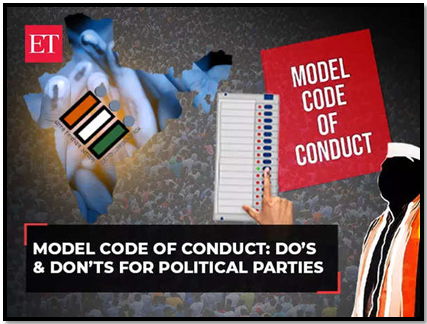“DOES THE MODEL CODE OF CONDUCT NEED LEGAL ENFORCEMENT FOR EFFECTIVE IMPLEMENTATION?
Syllabus:
- GS-2- Model code of conduct in elections , ECI’s Powers and the need for legal enforcement of MCC
Focus :
- The article debates whether the Model Code of Conduct (MCC) in India needs legal enforcement to improve its implementation during elections. It explores arguments for and against giving the MCC legal teeth, emphasizing the Election Commission of India’s existing powers, enforcement challenges, and the potential impact on the electoral process and political dynamics.
Source - ET
Allegations of Ineffectiveness
Public Perception of ECI’s Enforcement
- Common Allegations: The Election Commission of India (ECI) faces recurring accusations of partiality and delayed responses during elections.
- Vague Complaints: Media and political parties often make unspecific allegations against the ECI.
- Party Bias: Political parties tend to lodge complaints based on their own interests.
- Genuine Concerns: The validity of these complaints and the actions taken by the ECI are crucial for public judgment.
- Current Legal Status is that the MCC lacks legal enforceability.
- ECI’s Powers: The ECI possesses extensive powers under Article 324 of the Constitution to ensure free and fair elections.
- Legal Complications: Introducing legal teeth could delay the electoral process due to prolonged judicial proceedings.
- Efficiency of MCC: The MCC is more effective without legal complications, relying on the ECI’s existing powers.
T.S. Krishnamurthy’s Perspective
- Judicial Limitations: The ECI’s powers under Article 324 are limited to areas without existing legislative provisions.
- Current Framework: The ECI operates within the Constitution and the Representation of the People Act (RPA).
- Enforcement Challenges: Enforcement of MCC violations through existing legal mechanisms like the IPC or RPA can be slow and inconsistent.
- Proposal for Limited Legal Powers: Suggests minimal legal authority for the ECI to impose monetary penalties or temporary disqualifications to instill fear among violators.
About Model Code of Conduct :
From the day the election schedule is released until the day the results are made public, the MCC is in operation. Do’s during MCC: 1. Campaign Activities:
2. Government Conduct:
3. Political Discourse:
Don’ts During MCC: 1. Prohibited Activities:
2. Campaign Restrictions:
3. Polling Day Conduct:
4. Ethical Standards:
|
Impact on Political Process
Arguments Against Statutory Measures
- Disruption: Strict statutory measures might disrupt the political process.
- Scope of ECI’s Powers: The ECI’s powers are not all-encompassing and must operate within legal boundaries.
Examples and Proposals
- Monetary Penalties: Introducing fines for MCC violations.
- Temporary Disqualification: Imposing short-term disqualifications for severe violations.
- Political Party Consultations: Lack of recent discussions with political parties on improving MCC enforcement.
Judicial Proceedings and Timeliness
Efficiency Concerns
- Electoral Timelines: Judicial proceedings can be lengthy, conflicting with the need for expeditious election processes.
- Executive Actions: Emphasis on the need for swift executive actions rather than prolonged legal battles.
ECI’s Authority and Actions
- Reservoir of Powers: ECI can draw powers from Article 324 in the absence of statutory laws.
- Examples of Enforcement: Instances where the ECI has barred leaders from campaigning for short durations.
- Symbols Order: ECI’s authority under the Election Symbols Order, 1968, to suspend or derecognize political parties for MCC violations.
Ensuring a Level Playing Field
Current Challenges
- Uniform Application: Question of whether the ECI applies MCC regulations uniformly to all political leaders.
- Perceived Bias: Public perception of ECI’s impartiality in handling senior political leaders’ violations.
Regulation of Social Media
Growing Influence
- Campaigning Impact:Social media has a significant influence on election campaigning.
- Need for Regulation:Calls for discussions on regulating social media, hate speeches, and fake news.
- Current Limitations:The ECI’s limited power to swiftly address violations during the election process.
Benefits and Challenges
- Information Dissemination: Social media serves as a critical information source.
- Healthy Regulation: Need for balanced regulation to control misinformation while preserving the platform’s benefits.
Conclusion
- Ongoing Debate: Continuous discussion on the adequacy of the MCC and the ECI’s powers is essential.
- Potential Reforms: Consideration of minimal legal provisions for the ECI to enhance enforcement without disrupting the electoral process.
- Role of Stakeholders: Involvement of all stakeholders in refining the MCC and addressing contemporary challenges like social media influence.
Source:The Hindu
Associated article:
https://universalinstitutions.com/one-nation-one-election/
Mains Practice Question :
GS-3
“Critically examine whether the Model Code of Conduct (MCC) in India requires legal enforceability to ensure its effective implementation. Discuss the existing powers of the Election Commission of India (ECI) under Article 324 of the Constitution and the potential implications of providing legal teeth to the MCC on the electoral process and political landscape.” (250 words)




